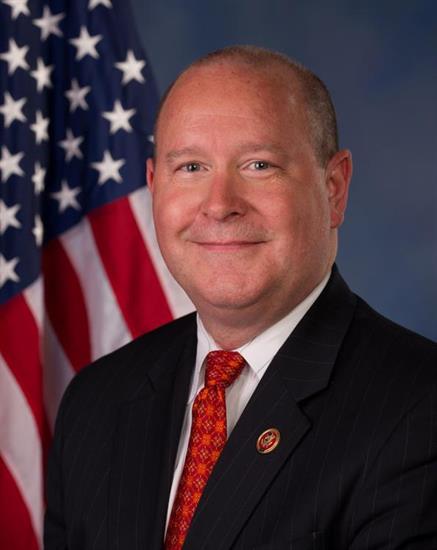In the News
In-Depth with Brad Byrd: Congressman Larry Bucshon
Terre Haute,
July 5, 2018
Brad Byrd was joined by Congressman Larry Bucshon to discuss the multitude of issues facing our country, and Buschon's legislation to strengthen opioid controls involving senior citizens
Watch the full video here
Brad Byrd was joined by Congressman Larry Bucshon to discuss the multitude of issues facing our country, and Buschon's legislation to strengthen opioid controls involving senior citizens. Transcription: Brad Byrd: Welcome to InDepth. In this very hot summer...the heat remains high on Capitol Hill. Lawmakers have a bevy of issues they are facing. I'm joined tonight by Indiana Eighth District Congressman Larry Bucshon. Congressman, thanks for joining me tonight. Congressman Laryy Bucshon: Well, thanks for having me tonight, Brad. I appreciate it. Brad: You’re playing major role – let’s talk about this first issue first – and would be the opioid crisis in America. You’re pushing legislation that is aimed at what some view as an addiction problem involving our seniors – elderly people. Tell me exactly what this legislation would do, Congressman Bucshon: Yeah, well, first of all, the opioid crisis is hitting everyone across socio-economic groups, across age groups, really been building for about the last 20 years, but now we’ve reached really a pinnacle here and we’re getting contaminated heroin coming in with fentanyl and people are dying from it. So what we’re trying to do, especially for seniors, because seniors are included in that group that are being, primarily affected by prescription drugs, is making sure that when you sign up for Medicare initially, the physician on your entry physical examination asks you about chronic pain and if you’re using opioids. The other thing we’re trying to do is make non-opioid alternatives more, uh, I would say easy to prescribe because in hospitals, opioids cost almost nothing, but a lot of the non-opioid alternatives are very expensive. So we’re doing a couple of things with Medicare to try to evaluate seniors initially and give them advice. And then also make non-opioid alternatives available. Brad: And that takes me to some of the pushback on this because an elderly person who has been legally prescribed, either Perocet or Lortab or Tramadol, opioids, uh, if that would be potentially taken away, a non-opioid painkiller, uh, you’re a doctor… Congressman Bucshon: Right. Brad: Are those really as effective as opioids? Congressman Bucshon: Well, some are and some aren’t. It depends on the patient. For example, my father. My father’s 83 and he has chronic back problems. There’s really nothing surgically that can be done. And non-opioid alternatives, like Advil, he actually can’t take ‘cause he’s had some kidney issues. So he, he does depend on an opioid a couple times a day just to be able to get out of the chair. So what we want to do is make sure that people have good advice. But we also want to make sure that people have the availability of medicines prescribed by their physician for legitimate chronic pain issues. And I think that is a big issue and we’re paying attention. Brad: And in this day and age of well, uh, some would say a lack of bi-partisanship… Congressman Bucshon: Yeah. Brad: What is the chance that this can survive Capitol Hill? Congressman Bucshon: I think it’s going to. The legislation is actually a big package that has already passed through the House and the Senate is doing the same, the same thing. And so, I think that it’s going to get to the President’s desk. This has been a bi-partisan effort. You know, opioid addiction is not a partisan issue. And we’re doing all kinds of things. There’s other things we needed to do to give the government more authority, for example, to prevent these things from being mailed to the United States from China, primarily. So it’s really comprehensive. I encourage viewers to go to my official website and they’ll be able to get more information about what Congress is doing on the passage. Brad: You tell me tonight you’re going to be heading to the border… Congressman Bucshon: I am. Brad: And we are in the middle of a huge debate in this country on the separation of immigrant children from their parents and I know you’ve made a statement online... Congressman Bucshon: I have, yes. Brad: and you, you do not tolerate the separation of immigrant families. Congressman Bucshon: No. I don’t think it’s the right approach. Let me just a little background on why it happened. During the Obama administration when families came to the border, it would be like getting a traffic ticket and then give, get a court date. And that’s what they did for these families and then with sponsors or family members released them into the United States. The Trump Administration changed that policy and instead of just giving you a ticket and giving you a court date, they actually physically arrested people for crossing the border illegally. And I think what they didn’t understand, initially, was by law, they were going to have to separate children from their parents. And when President Trump realized this was an issue, he did an Executive Order to reverse it. So that was appropriate, that they did that… Brad: And the order has been reversed, but there's estimates that perhaps 2,000 children are still separated from their families, and this is throughout the countries.
|

